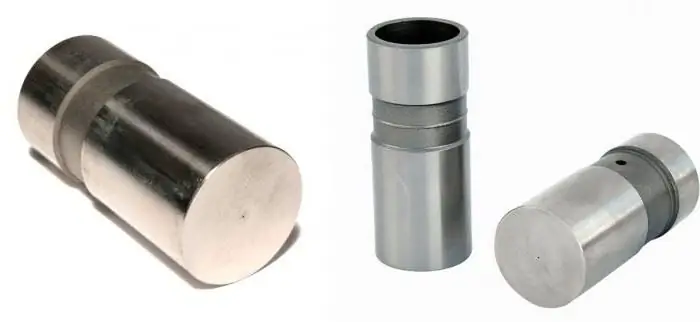2026 Author: Erin Ralphs | ralphs@carsalmanac.com. Last modified: 2025-01-22 21:14:09
Hydraulic mechanisms do not work without the use of a specialized lubricant. With its help, mechanical energy is transferred to the place of its consumption. Compressing the oil changes the amount of force applied. Simply put, hydraulic oil ensures that hydraulics function correctly and efficiently.
Quality lubricating fluid extends the life of hydraulic equipment even under extreme conditions.

Basic Features
Hydraulic oils must have certain properties in order to fulfill the stated functions:
- Antioxidant.
- Viscosity-temperature.
- Antifoam.
- Demulsifying.
- Filtering.
- Anti-wear.
- Anti-corrosion.
With the above properties, hydraulic grease has oxidation resistance and viscosity, which allows it to work in various temperature conditions. Long service life under high loads is ensured by minimal foaming, protection of the system from debris and the ability to separate water. The oils contain antioxidant additives that reduce the energy consumption of the hydraulic drive.

Viscosity
The viscosity of hydraulic oil depends on the type of pump installed and is divided into three categories:
- Optimal.
- Minimum.
- Max.
Minimum viscosity is most important when the hydraulic system is at its hottest. This property does not allow the lubricant to escape through the seals. The maximum level of viscosity, on the other hand, is important at low ambient temperatures. This indicator is required for pumping lubricant through the system. When selecting oil, it is necessary to take into account the technical characteristics of the pipeline and the power of the pump. Optimum viscosity combines all the basic requirements and allows you to minimize losses. Do not mix oils of different viscosities.
Classification of oils
Due to the area of use of lubricants, they are classified as working fluids for various types of hydraulic systems:
- Aircraft, river, land and sea equipment.
- Shock-absorbing and hydraulic brake devices.
- Industrial equipment.
Oil is classified by type of production - synthetic, mineral with and without additives. Grease can also vary in color characteristics:for example, synthetic and mineral oils are red and cannot be mixed with each other. Yellow oils, on the other hand, can be mixed with red oils. Synthetic substances of a green tint should not be mixed with other lubricants. Similar restrictions apply to mineral oils of the same color.

The hydraulic systems of imported cars are filled with synthetic lubricants - polyglycol, polyalphaolefin, and esters. The advantage of fluids is the high quality and stability of the viscosity index, providing a long service life of the system without reducing its performance. Foreign and domestic hydraulic oils must not be mixed.
Nuances
To ensure the smooth operation of hydraulics, the lubricant must meet certain standards:
- On the territory of Russia adopted GOST, which meets international standards. Hydraulic fluids correspond to the number 17479.3-85, consisting of three groups of signs marking the scope of operation, name and viscosity class.
- The hydraulic mechanism operates at high temperatures, so the flash point of hydraulic oil must be high, as opposed to the freezing point - it must be very low.
- Lubricants are thoroughly filtered, but the filter element accumulates polymer additives that are added to the composition to increase the viscosity index. In an emergency, this is signaled by a pressure sensor. When replacingoil in hydraulics, the condition of the filter must be checked and, if necessary, it is replaced.
- The quality and condition of the seals should be checked regularly to avoid leaks. The material from which they are made must be compatible with the oil used. It is advisable to choose branded seals designed for specific hydraulics.
- Oils designed for different hydraulic systems must not be mixed.

Labeling of hydraulic oils
Classification of lubricants depends on the area of use. There are eight types of oils:
- VMGZ. Brand designed for hydraulic mechanisms of vehicles operating in open areas.
- MGE. Lubricating fluids for agricultural machinery, including oils for MTZ hydraulics - tractors and excavators.
- A. Brand for torque converters and automatic transmissions.
- R. Grease for hydraulic lifts and steering.
- AUP. Lubricating fluid for land and marine special equipment. Designed for hydraulic lifting gear system.
- AU. Spindle oil with a low pour point. The main area of application is machines operating at high speeds.
- GT. Oil for diesel trains, in particular - for turbo gearboxes.
- ESH. High load hydraulic fluid.
When choosing which oil to pour into hydraulics, it is necessary to take into account not only the manufacturer,but also the compliance of the fluids with the specified specifications of the actuators.

Hydrocracking technology
Oils are made not only on a synthetic and mineral base, but also on hydrocracking. Such working fluids have the best parameters and characteristics due to the sophisticated purification technology used. Hydrocracked oils practically do not differ from synthetic ones, and therefore manufacturers usually do not indicate the method of their manufacture. It does not affect the quality. Oils are used in multi-valve engines equipped with hydraulic compensators.
Scope of application
The hydraulic system must only be operated with clean and high quality oil. Filtered waste material must not be used, otherwise the system may be damaged.
An important point is to change the oil in the hydraulic mechanism. For this, a filter and a pump are used - only when they are used, dirt does not enter the system.
Replacement of lubricant is carried out in the following cases:
- Natural wear of additives leading to fluid leakage.
- Poor condition of the oil according to the results of express control.
In order to avoid costly repairs to the entire hydraulic system, timely oil changes are essential. Mixing liquids of different colors and different manufacturers is prohibited. When mixing, the viscosity index must necessarily match.

Features of hydraulic oils
What oil to fill in hydraulics? Lubricating fluids for mechanisms should be selected taking into account temperature and viscosity properties. The use of oil that is too viscous can cause a decrease in the efficiency and power of the system, which will lead to an increase in the load on the equipment. The density of the oil used directly depends on the temperature regime in which the hydraulic system is operated. This criterion is indicated in the hydraulic passport and must be taken into account when choosing a lubricant.
Oil is selected depending on the season of operation. In the cold season, winter hydraulic oil with appropriate characteristics is used.
Anti-corrosion and antioxidant properties play an equally important role in the selection of a lubricating fluid. These characteristics have an impact on the corrosive wear of the mechanism and the formation of deposits on the walls.
Advantages and disadvantages
The oils poured into MTZ 82 hydraulics have their own advantages and disadvantages. The former include the protection of mechanism parts from corrosion and wear, efficient energy transfer, the ability to operate in a wide temperature range, and the prevention of plaque formation.
In the presence of contaminants and third-party impurities, oil can disable the machine or cause serious damage. Safe operation of hydraulic oil is possible only after it has been thoroughly filtered.

Hydraulic oil "Gazpromneft Gidravlik"
Designed for use in domestic and imported hydraulic systems of industrial equipment operating in normal and severe conditions and requiring alloyed oils with a high level of performance and optimal filterability for their operation.
It has the following properties:
- Improved demulsifying, anti-corrosion and anti-foam performance.
- High anti-wear properties for long equipment life.
- Optimum viscosity-temperature properties that maintain a constant level of viscosity in a specific temperature range.
- Excellent thermal and oxidative properties that extend oil life.
Recommended:
What kind of oil to fill in the Niva-Chevrolet: types, characteristics, composition of oils and their effect on the operation of a car

The article provides detailed information about the oil that is best filled in the Chevrolet Niva. These are popular manufacturers, varieties and features of oils, as well as detailed instructions for replacing old oil with a new one
Which oil is better to fill in the engine - synthetic, semi-synthetic or mineral?

Today, among car owners, there is a lot of controversy about which oil is better to fill in the engine. Some prefer mineral fluids, others recommend taking synthetic oils, and still others do not choose anything other than semi-synthetics. In addition, the problem of choice is created by many companies that advertise their products as the most modern and optimal. Consider several criteria for choosing lubricants and find out which oil is better to fill in the internal combustion engine
Flushing hydraulic lifters: procedure. Knock of hydraulic lifters on cold

Do-it-yourself car repair in most cases allows not only to save a lot, but also to prevent serious malfunctions in a timely manner. In vehicles equipped with 16-valve cylinder heads, hydraulic lifters may knock. It is possible to correct the situation. Flushing hydraulic lifters will help. Let's see how it's done
Hydraulic compensator - what is it? Knock of hydraulic lifters: causes, repair

Modern cars are equipped with a device such as a hydraulic compensator. What is this node? How does he work? All this and more - further in our article
The hydraulic compensator knocks on the cold. Knock of hydraulic lifters on a cold engine

Every motorist, when operating a vehicle, will certainly listen to how his car works. The appearance of extraneous noise in the operation of the engine, as a rule, does not bring joy to the owner. The presence of the slightest malfunction requires urgent diagnostics and troubleshooting

